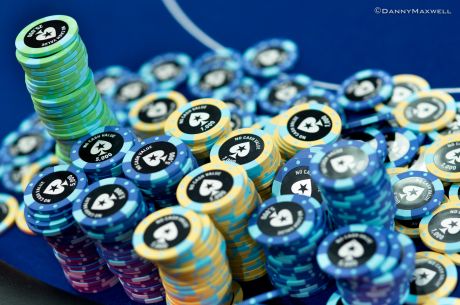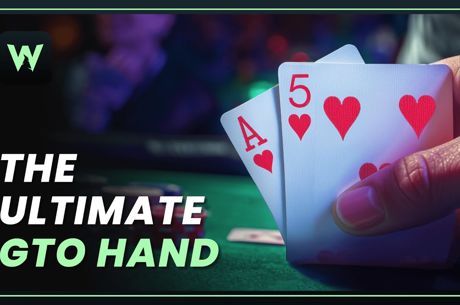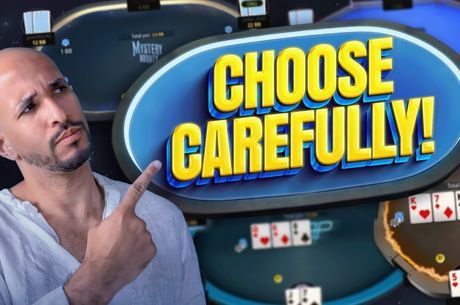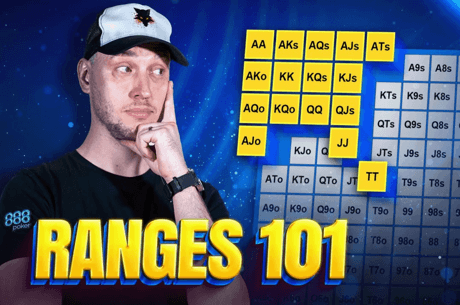Note to Self: If You’re Gonna Lose A Flip, At Least Lose It Right

One of the most important considerations in poker is position. When you have position on your opponents, you have a distinct advantage over them. The players whom you will have position on most often are those on your right. Additionally, your positional advantage is enhanced as the stacks get deeper between you and these players.
The converse of these statements is true when you play pots with players on your left. Now, they are the ones who will most often have a positional advantage on you, and again, that advantage will increase as stacks get deeper.
Pondering this dynamic has led me to experiment with the following theory. When playing tournament poker, I should try to play more pots with the players on my right and avoid flipping in big pots with the players on my left when I have a big stack and they have shorter stacks. Winning chips from any of these players is great, but I obviously cannot win every pot. Since I am going to lose chips often when I flip, I’d rather lose them to the players on my right.
Here’s why.
Advantages of losing to the players on your right
The biggest advantage of losing chips to the players on your right is that you will have the best chance of winning chips back from these players in the future. This is because you have position on them and, as already noted, this positional advantage only becomes bigger when the effective stacks between the two of you become bigger.
Let’s say I have a stack of 100 big blinds and double up a player on my right with 25 BBs. This is not the end of the world because I still have position on him and, because the effective stack between us is now 50 BBs, I can better use that positional advantage with more room for plays like set mining and three-betting light.
Another advantage is that the players on your right are less able to use their chip stacks against you. If they are smart, positionally aware opponents, they will be more focused on getting chips from the players on their right and not from the savvy savant on their left. For this reason, I like to think of the players on my right as my pseudo-partners. I root for them to win pots against others and don’t mind it as much if they win pots against me. After all, I know I will have access to those chips in the future thanks to the position I have on them.
Disadvantages of losing to the players on your left
The biggest disadvantage of losing chips to short-stacked players on your left when you have a big stack is that they are the ones most able to use those chips against you in the future and prevent you from stealing pots light.
For example, let’s again say that I have a stack of 100 BBs, but this time, I double up a 25-BB stack on my left. Now that player is no longer “handcuffed,” meaning that the options like set mining and three-betting light are easier for her with her new 50-BB stack than they were before when she only had 25 BBs.
This also means I will not be able to steal as wide as I could before. If this is a smart, positionally aware player, she will be looking to use her newfound flexibility to attack the player on whom she has the biggest positional advantage, a.k.a. me.
Strategic Adjustments
This theory has lead me to experiment with some strategic adjustments to play more pots with the players on my right and to flip less often for big pots with those on my left.
First, I am much more likely to three-bet opens from players on my right. This allows me to isolate them and shut the players on my left out of the pot. If I win the pot, great! If not, at least I lose chips to players who are less able to use them against me and are more likely to lose them back to me in the future.
This adjustment assumes that the players on my left would rarely cold four-bet light or that the players on my right would rarely four-bet light in response to my high three-betting frequency. In the small stakes games I play, very few players cold four-bet light and most original raisers flat too many hands out of position. If the players around me ever readjust and pull the trigger on these plays like better players do at higher stakes, then I will have to revert back to a more balanced strategy.
Second, I am much less likely to play big pots out of position to players on my left without a big edge. For example, if I open and get three-bet by a player on my left, I am experimenting with a much tighter continuing range than many players. If I determine that the spot is only slightly better than break-even at best, I opt to pass. This is not to say I am folding in solidly +EV spots, but if I am going to risk playing a big pot with a guy on my left, I want a better than barely break-even chance at winning it.
Also, if a player on my left three-bet shoves, I am more likely to fold if the call is a break-even coin flip. I’ve heard people say that they have to call when getting 2-to-1 if they expect to win 33% of the time. I don’t believe that this is true. By definition, a break-even spot implies that there is no edge to be gained, so it does not matter what you do. If the best I can get on a call is break-even or only slightly better, I’d much rather concede the small pot than take a high chance of shipping a big pot to a currently handcuffed player with position on me.
Conclusion
Whenever we flip for big pots, by definition, we lose them about half the time. Understanding the importance of position gives us an opportunity to claim a small victory when we lose these pots to players who we have an advantage on in future pots. For this reason when I have a big stack, I welcome flips to my right and avoid flips to my left.
This is something I have been trying out with good results so far. Even if it turns out to be less than optimal, it has led me to play more pots in position, which is always a good thing.
Want to stay atop all the latest in the poker world? If so, make sure to get PokerNews updates on your social media outlets. on Twitter and find us on both and !









